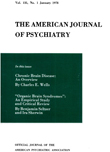PERSONALITIES OF AMERICAN PSYCHOTHERAPISTS
Abstract
Many similarities in the development and characters of these men are evident. All were striking in appearance and unusually able through force and charm of personality to make immediate favorable contacts with people. All started life with roots in medical tradition, since all came from medical families. All were burdened by an extreme degree of responsibility beginning early and all through life. All were very sensitive and reactive. In fact the decision to work with medical, neurological and mental patients arose in part in each man as a reaction against blood and suffering, intense enough to cause each of them to veer away from the surgical approach.
Each had a period of forced inactivity due to illness when he was in the very impressionable period between adolescence and young manhood. That this illness was in each case tuberculosis may have been accidental, but it is probably not accidental that this period of forced introversion brought with it the change in point of view that resulted in an intense interest in healing the mentally ill. This trend in their professional development probably sprung from a cognizance forced on them in their inactivity of mental problems in themselves.
They were vigorous men capable of very hard work. But they also suffered long spells of illness and fatigue or depletion. With Mitchell we have seen that he had depressed and fatigued periods at least three times in his life and probably a great many more times to a lesser degree. Dr. Salmon was subjected to migraine headaches, and also had some episodes of depression of mood, especially during his tuberculosis cure and toward the end of his life. Dr. Riggs suffered from recurrent attacks of a tubercular condition and went through periods of fatigue and feelings of frustration and exasperation both with his bodily health and with the work he was doing. All three of these men found great relaxation and pleasure in the woods and country, and especially the water. Riggs and Salmon were enthusiastic yachtsmen. Mitchell was an ardent fisherman.
All three were endowed with a high degree of controlled and directed extroversion. All had extraordinary vitality, intensity and conviction and all had great ability to focus their attention on the problem at hand, whether it was playing the traps, worrying over the problem of snake venom, struggling with a road in France or reconstructing a patient.
All were strongly emphatic, were particularly able to feel into and through the problems of their patients. This talent was made effective by the ability to verbalize and by an understanding of forceful emphatic communication which enable them to express their understanding in an arresting and dramatic manner.
Access content
To read the fulltext, please use one of the options below to sign in or purchase access.- Personal login
- Institutional Login
- Sign in via OpenAthens
- Register for access
-
Please login/register if you wish to pair your device and check access availability.
Not a subscriber?
PsychiatryOnline subscription options offer access to the DSM-5 library, books, journals, CME, and patient resources. This all-in-one virtual library provides psychiatrists and mental health professionals with key resources for diagnosis, treatment, research, and professional development.
Need more help? PsychiatryOnline Customer Service may be reached by emailing [email protected] or by calling 800-368-5777 (in the U.S.) or 703-907-7322 (outside the U.S.).



